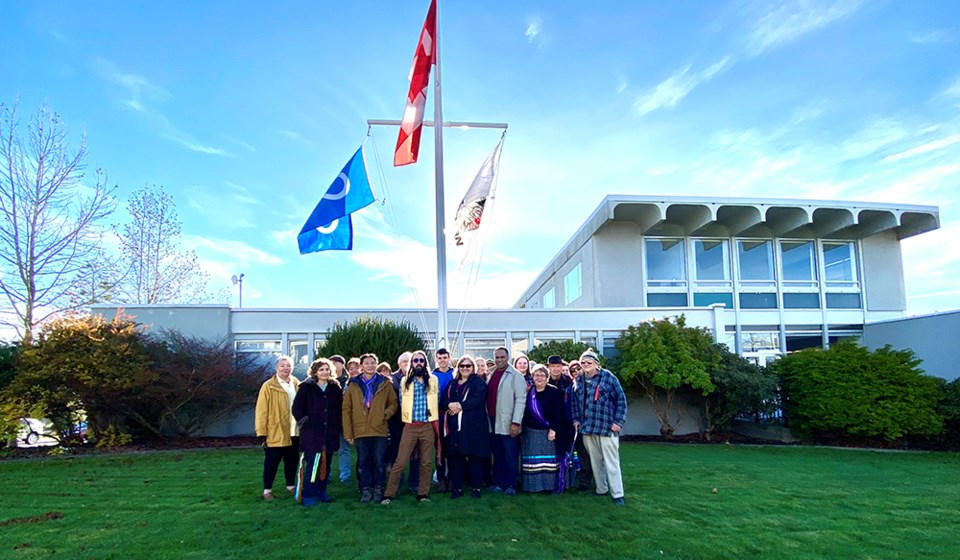Métis Nation qathet vice president Zevier Brewer delivered the following speech during a Louis Riel Day flag raising ceremony at Powell River City Hall on Thursday, November 16:
"We respectfully acknowledge that we gather on the traditional territories of the Tla’amin Nation. We would like to thank them for their support in raising our flag jointly with theirs to honour Louis Riel.
"Although most of us have heard of him, not everyone remembers why. He has been described as a charismatic leader, a rebel, and even a traitor. On November 16, 1885, Louis Riel was hung for treason after being the leader of the Red River Rebellion. The result of Louis Riel's wrongful execution was the mass labelling of Métis peoples across Canada as and traitors, for generations, many felt the need to hide our Métis culture and identity.
"Who is Louis Riel, and how did he and get his own day of recognition? Louis Riel was a politician a leader of the Métis people. He led two resistance movements against the Government of Canada and its first prime minister, John A. Macdonald. Riel defended Métis rights and identity as the west came progressively under the Canadian sphere of influence.
"Riel was also defender of religious freedom, French language rights, and gender equality. He is considered the "Father of Manitoba," but it's his legacy as a defender of the Métis way of life that established him as a hero and an icon.
"Riel was the leader of the Provisional Government of the Red River Settlement, negotiating with the government of Canada to Establish Manitoba as a Province in 1870 out from under the corporate rule of the Hudson's Bay Company. His rebelliousness was focused on preserving the culture and rights of Métis peoples and their homelands in the northwest as these lands progressively shrunk under colonial expansion. He died a staunch advocate for the Métis, and for minority rights in general, including all Indigenous.
"Métis have been documented in British Columbia as early as 1793, although we have made strides in recent years as it pertains to the acknowledgement of inherent rights of Métis people, more work is still needed.
"In the years that followed the Red River Rebellion, Riel was turned into a traitor, thanks in no small part to the $5,000 bounty put on his head by the premier of Ontario. Riel found asylum in Dakota Country, Quebec, then Montana; he was even elected multiple times to the House of Commons (he never was able to take his actual seat). He returned to the Prairies after an invitation to lead a Métis Rebellion in Saskatchewan that is known as the North-West Rebellion. His action failed, and Riel was tried by an all-white, all-protestant jury and hung for treason by the Canadian government on November 16, 1885.
"Louis Riel was accused of high treason for standing up for Métis rights. 138 years ago in Regina, Saskatchewan, he was executed for his resistance to the Canadian government's intrusion on Métis Lands. November 16, 1885, is a significant day for Métis peoples as it is the national public commemoration of Riel's life and the struggles he led.
"In the years since the Red River and North West Rebellions, Riel's position has softened from a treasonous individual into a folk or anti-hero. A ceremony is held every year at the provincial Legislature at Queen’s Park, the Legislature is where the price was put on Louis Riel’s head. Also, at the park there is an actual monument to the Northwest Rebellion recognizing the soldiers who fought against the Métis. This memorial to heroism was not given to Métis people across Canada they were called traitors and many generations after had to hide their Métis culture and heritage.
"Louis Riel has never stopped being hero to Métis People across the country. To counter decades of disparaging narratives about Riel, the Red River Rebellion and the North-West Rebellion, Métis citizens, chartered Community Councils, and communities across the country, including the Metis Nation of British Columbia (MNBC), hold events on November 16. These celebrate Métis culture, recognize the many contributions of the Métis to Canada, and to highlight the struggles that Métis have faced and continue to face in the many years since the Red River Rebellion.
"Louis Riel Day is held every year on November 16 across the Métis homeland. November 16 is the anniversary of Riel's wrongful execution in 1885. During that year, Riel led Métis people in the Northwest Resistance, which was a stand against the Government of Canada because it was encroaching on Metis rights and our way-of-life.
"We would like to invite all British Columbians to reflect on the sacrifices made by our Métis ancestors, to remember Louis Riel as the founder of Manitoba, and as the leader of the Red River Resistance. Although Louis Riel Day commemorates one of the great tragedies of Canadian history, it is first and foremost a day to celebrate Métis culture."
Join the Peak's email list for the top headlines right in your inbox Monday to Friday.




